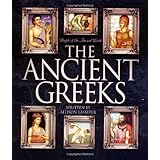
Average Reviews:

(More customer reviews)The People of the Ancient World series takes a different approach to the study of ancient civilizations in that this look at "The Ancient Greeks" is arranged by sociological strata rather than following the standard chronological approach. The historical chronology of Greek culture is laid out by Allison Lassieur in the introduction to this volume, so that it is clear to young readers how Mycenaean culture gave way to a Dark Age from which Archaic Greece emerged and that after the city-states battled Persia for Control of their land the Greek ascendancy was realized during the Classical Age and the Hellenistic Greece that followed the death of Alexander the Great. But the book itself starts at the top of Greek society with the people of the government and ends up with the slaves and workers, with Lassieur creating a portrait of life in Ancient Greece through a look at its inhabitants.
This approach suits the ancient Greeks given that in ancient Athens there were four economic classes: the wealth aristocrats (pentakosiomedimnoi), knights (hippada telounts), farmers (zeugiatai) and poorest Athenians (thetes). But Lassieur follows more of an occupational approach looking at the people of the government, scientists, athletes, philosophers and thinkers, priests and priestesses, poets and playwrights, artists and architects, warriors, and slaves and workers. That first chapter on the people of the government covers not only the evolution of government in Greece, but also the wide range of governments that existed (i.e., a comparison of Athenian democracy with Sparta's military city-state).
Consequently, other history books will give you more of a sense of what happened when, but this look at "The Ancient Greeks" will do a better job of telling young students who did what. If you have to do a report on a specific occupation, such as a priestess at Delphi, or a specific person like the playwright Sophocles, this book will be very helpful. One of the nice things about this series is that as we go along Lassieur discusses how we know what we know about this particular ancient civilization. There are also sidebars highlighting important archeological discoveries such as the Colossal Zeus at Olympia and the Theater at Epidaurus, and interesting facts about things like Plato's Academy and the Athenian Soldier's Loyalty Oath.
The back of the book includes a Time Line that covers from when the early Greeks established their power 1600-1200 B.C. to when Theodosius I banned pagan festivals and the Olympics and closed the temples in 392 A.D., and a Biographical Dictionary of important historical figures from Aeschylus to Thucydides. There is a Glossary of key terms from "apella" to "tyranny," and a list of books, organizations and online sites where young readers can go To Find Out More. Other People of the Ancient World Titles look at "Ancient Mesopotmia," "The Ancient Chinese," "The Ancient Egyptians," "The Ancient Inca," and "The Ancient Romans."
Click Here to see more reviews about: The Ancient Greeks (People of the Ancient World)
FOR USE IN SCHOOLS AND LIBRARIES ONLY. Explores life in ancient Greece through its people. Learn about philosophers, such as Aristotle, and poets, such as Homer, and many others. Read about some of the discoveries and writings that led to our present-day understanding of this fascinating civilization.--This text refers to the Library Binding edition.
Click here for more information about The Ancient Greeks (People of the Ancient World)

0 comments:
Post a Comment